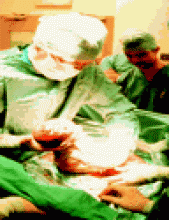- © 2004 Canadian Medical Association or its licensors
National Research Council president Dr. Arthur Carty chuckles at the suggestion that he's leaping from the petri dish into another form of bacterial culture otherwise known as politics.

Figure. Dr. Arthur Carty, the current NRC president. Photo by: NRC Canada
He offers a different meta- phor. “From the frying pan into the fire,” quips the organo-metallic chemist and soon-to-be National Science Advisor to the Prime Minister of Canada.
Not that the native of England is entirely unfamiliar with flames, having been well- cauterized after assuming the presidency of the NRC in 1994 and being immediately forced to hack 17% off the agency's budget.
He'll need all the savvy he garnered from that experience to survive the political landmines in his new post, created late last year by Prime Minister Paul Martin. In selecting Carty as the nation's inaugural scientist-in-chief, Martin looked to a fellow advocate of his oft-expressed belief that science must more directly serve economic needs, particularly through increased commercialization of the fruits of academic research. As president of a once-moribund agency that rejuvenated itself by becoming heavily involved in collaborative research aimed at developing economic spin-offs, Carty clearly fit the bill.
Carty, who assumes the post Apr. 1, has been charged with finding ways to promote more commercialization and more industrial innovation, while also developing a mechanism for determining whether Canada should support international multibillion dollar big-science projects.
Carty says he hopes Martin isn't just looking for backroom political advice that is dutifully heard and then systematically ignored. “I guess I will fail if the advice provided falls on stony ground.”
Colleagues say Martin may well have got more than he bargained for with Carty, who can be expected to adopt the same approach he used in re-tooling the NRC, where he pressed for increased research funding to allow the agency to meet the parallel demands of scientific excellence and economic growth.
“That takes a lot of talent,” says Natural Sciences and Engineering Research Council President Dr. Thomas Bruzustowski. — Wayne Kondro, Ottawa











